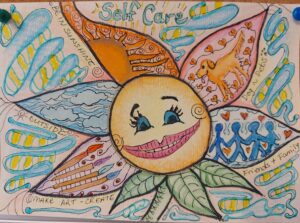
I was busy;
but not in a way most people understand.
I was busy taking deeper breaths.
I was busy silencing irrational thoughts.
I was busy calming a racing heart.
I was busy telling myself I am okay.
Sometimes, this is my busy –
and I will not apologize for it.”
~Brittin Oakman
The term self-care is used often in media. I want to clarify that self-care is not simply attending to one’s basic needs for sleep, food, hygiene, and shelter. It is also not consumerism such as splurging on a new Louis Vuitton purse, drinking fine champagne or a shopping spree. Sorry “Confessions of a Shopaholic” lovers! Genuine self-care includes taking time for one’s health and well-being such as emotionally, socially, physically, spiritually, creatively, in the workplace and professionally, in relationships and in a balanced way.
I read an interesting article that stated self-care is for “girls”. It caught my eye. I notice in my psychotherapy practice that women struggle with guilt related to attending to their self-care. Men easily transition into self-care. In a heartbeat, they go to the gym, hit the golf course, cycle or play pickleball.[1] In society, women are judged negatively for taking time for themselves, rather than caring for others. Despite these double standards, men and women ask yourselves what exactly you do for self-care and how often? Many of my clients get a wake-up call when they complete my self-care assessment questionnaire.
When I first did the questionnaire, my professional and creative self-care were excellent but my spiritual and physical self-care were lacking. Completing this survey made me see where I could improve. I made a few simple tweaks like drinking enough water, a quick yoga video three times a week, walking during my lunch hour and listening to inspirational speakers when I drive. It was not a lot of time investment, just a different focus. The results have been very beneficial for my health and balance.
Many of my clients feel guilty about taking time for themselves. However, some people wrongly learn at a young age that taking time for oneself is selfish. When this happens, we collaborate on increasing self-compassion and acceptance. We work on turning down the volume of their inner critic and judge through art therapy. A little self-compassion goes a long way.
“You yourself, as much as anybody in the entire universe, deserve your love and affection.” ―Buddha
Attending art therapy is an excellent form of emotional and creative self-care. It is a safe space to share and learn a variety of coping tools. Think of increasing your self-care as a devotion to self-improvement and well-being. If you would like more information on Art Therapy Guelph and how we can help you, contact us today for a free get-acquainted chat.
[1] Karson, M. (2014, December). Self care is for girls. Psychology Today. Retrieved from Self-Care Is for Girls | Psychology Today Canada.




